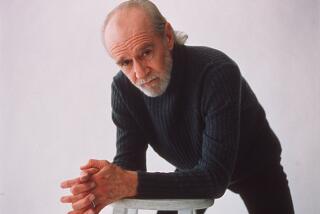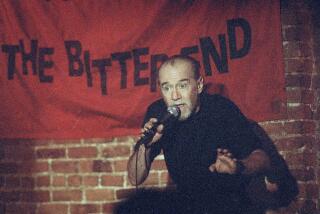George Carlin Plans to Test Language Limits at Fox TV
- Share via
Last week it was CBS having to bleep Madonna during her appearance on “Late Show With David Letterman.” This week it was Fox that was dealing with similar language from George Carlin on his sitcom for the network.
In an obvious parody of his own indirect role in the so-called “seven dirty words” case that led to a U.S. Supreme Court ruling in 1978, the comedian was planning to tape an episode of “The George Carlin Show” Thursday night in which he would utter a four-letter synonym for sexual intercourse seven times.
Fox said it would delete the words before the program is broadcast April 24 in its usual 9:30 p.m. slot.
“It’s our intention that viewers will neither hear nor see the actual words being spoken,” a Fox spokesman said.
The representative declined to discuss the matter further, although there was no indication that Fox was particularly unhappy with Carlin. “We have a very good relationship with George and the show,” the spokesman said.
In the series, Carlin plays George O’Grady, an irreverent taxi driver and street philosopher with opinions about everything. In the episode taping Thursday, another cab driver provokes him by cutting him off in traffic. What O’Grady doesn’t know is that a member of the Taxi Commission is his passenger and hears his invectives. O’Grady is asked to apologize but he stands on his right to free speech and has a dream in which he discusses the First Amendment with Benjamin Franklin, Thomas Jefferson and George Washington.
In provoking Fox to edit him, Carlin was harking back to the 1978 Supreme Court decision that upheld the right of the Federal Communications Commission to prohibit certain language at times when programming is “uniquely accessible to children.”
The case stemmed from a listener complaining about a New York radio station having played in the afternoon a portion of a Carlin record album on which he talked about the seven words “you couldn’t say on the public airwaves.” The FCC reprimanded the station but the station took the matter to court.
Ultimately the Supreme Court held that “patently offensive, indecent material presented over the airwaves confronts the citizen not only in public but also in the privacy of the home where the individual’s right to be let alone plainly outweighs the First Amendment rights of the intruder.”
Carlin didn’t seem particularly disturbed to learn that he would be bleeped. “You don’t come into these situations attempting to change the rules,” he said Thursday. Comedians and networks don’t have the same mandate, he said, adding, “it’s up to the network to make the last decision.”
More to Read
The complete guide to home viewing
Get Screen Gab for everything about the TV shows and streaming movies everyone’s talking about.
You may occasionally receive promotional content from the Los Angeles Times.






